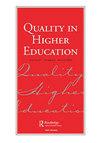Data-driven analysis for evidence-based decision making at universities: benchmarking, software tools and weighted indicators in quality assurance – analytical framework of Tbilisi State University
IF 1.5
Q3 EDUCATION & EDUCATIONAL RESEARCH
引用次数: 0
Abstract
Abstract Arrival of managerialism, call for accountability, efficiency and effectiveness marked a new era in higher education. With the growing demand for evidence-based and data-driven analysis of higher education institutions’ performance from internal and external stakeholders, universities are looking for ways to successfully implement performance indicator and benchmarks in management and quality assurance. Quality assurance is becoming more evidence-based, outcome-driven and focused on effectiveness. The article presents an analytical framework developed at Tbilisi State University that is based on indicators, software tool and metrics, intended to meet individual needs of the institution. The article adds to the debate about using indicators as the tool for evaluating university performance at different levels. Although many fear that it can lead to oversimplified quantitative evaluation, the article argues that indicators, best reflecting what should be measured, and how, can serve as the basis for the continuous quality enhancement at the university.数据驱动的大学循证决策分析:质量保证中的基准、软件工具和加权指标——第比利斯国立大学的分析框架
管理主义的到来,对问责、效率和效益的呼唤,标志着高等教育进入了一个新的时代。随着来自内部和外部利益相关者对高等教育机构绩效的循证和数据驱动分析的需求不断增长,大学正在寻找成功实施绩效指标和管理和质量保证基准的方法。质量保证正变得更加以证据为基础,以结果为导向,注重实效。本文介绍了第比利斯国立大学基于指标、软件工具和度量标准开发的分析框架,旨在满足该机构的个性化需求。这篇文章增加了关于使用指标作为评估不同层次大学表现的工具的争论。尽管许多人担心它会导致过度简化的定量评估,但文章认为,最能反映应该测量什么以及如何测量的指标可以作为大学持续质量提高的基础。
本文章由计算机程序翻译,如有差异,请以英文原文为准。
求助全文
约1分钟内获得全文
求助全文
来源期刊

Quality in Higher Education
EDUCATION & EDUCATIONAL RESEARCH-
CiteScore
3.30
自引率
14.30%
发文量
32
期刊介绍:
Quality in Higher Education is aimed at those interested in the theory, practice and policies relating to the control, management and improvement of quality in higher education. The journal is receptive to critical, phenomenological as well as positivistic studies. The journal would like to publish more studies that use hermeneutic, semiotic, ethnographic or dialectical research as well as the more traditional studies based on quantitative surveys and in-depth interviews and focus groups. Papers that have empirical research content are particularly welcome. The editor especially wishes to encourage papers on: reported research results, especially where these assess the impact of quality assurance systems, procedures and methodologies; theoretical analyses of quality and quality initiatives in higher education; comparative evaluation and international aspects of practice and policy with a view to identifying transportable methods, systems and good practice; quality assurance and standards monitoring of transnational higher education; the nature and impact and student feedback; improvements in learning and teaching that impact on quality and standards; links between quality assurance and employability; evaluations of the impact of quality procedures at national level, backed up by research evidence.
 求助内容:
求助内容: 应助结果提醒方式:
应助结果提醒方式:


